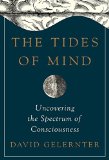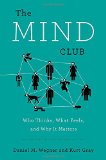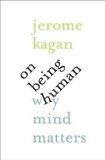(NOTE: As an Amazon Associate I earn from qualifying purchases.)

The Tides of Mind: Uncovering the Spectrum of Consciousness by David Gelernter (Liveright, 2016)
(kindle ed.), (amazon.co.uk)
Book description from the publisher:
A “rock star” (New York Times) of the computing world provides a radical new work on the meaning of human consciousness.
The holy grail of psychologists and scientists for nearly a century has been to understand and replicate both human thought and the human mind. In fact, it’s what attracted the now-legendary computer scientist and AI authority David Gelernter to the discipline in the first place. As a student and young researcher in the 1980s, Gelernter hoped to build a program with a dial marked “focus.” At maximum “focus,” the program would “think” rationally, formally, reasonably. As the dial was turned down and “focus” diminished, its “mind” would start to wander, and as you dialed even lower, this artificial mind would start to free-associate, eventually ignoring the user completely as it cruised off into the mental adventures we know as sleep.
While the program was a only a partial success, it laid the foundation for The Tides of Mind, a groundbreaking new exploration of the human psyche that shows us how the very purpose of the mind changes throughout the day. Indeed, as Gelernter explains, when we are at our most alert, when reasoning and creating new memories is our main mental business, the mind is a computer-like machine that keeps emotion on a short leash and attention on our surroundings. As we gradually tire, however, and descend the “mental spectrum,” reasoning comes unglued. Memory ranges more freely, the mind wanders, and daydreams grow more insistent. Self-awareness fades, reflection blinks out, and at last we are completely immersed in our own minds.
With far-reaching implications, Gelernter’s landmark “Spectrum of Consciousness” finally helps decode some of the most mysterious wonders of the human mind, such as the numinous light of early childhood, why dreams are so often predictive, and why sadism and masochism underpin some of our greatest artistic achievements. It’s a theory that also challenges the very notion of the mind as a machine?and not through empirical studies or “hard science” but by listening to our great poets and novelists, who have proven themselves as humanity’s most trusted guides to the subjective mind and inner self.
In the great introspective tradition of Wilhelm Wundt and René Descartes, David Gelernter promises to not only revolutionize our understanding of what it means to be human but also to help answer many of our most fundamental questions about the origins of creativity, thought, and consciousness.
Google Books preview:





